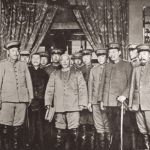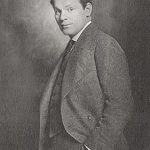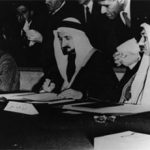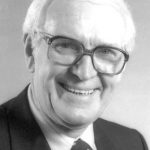 1916 – The last emperor of China, Yuan Shikai, abdicates from the royal throne and, later, restores the Republic of China. Yuan Shikai was a Chinese military and government official who rose to power during the Qing Dynasty. He tried to save the dynasty with a number of modernization projects, including bureaucratic, fiscal, judicial, educational, and other reforms, despite playing a major role in their failure.
1916 – The last emperor of China, Yuan Shikai, abdicates from the royal throne and, later, restores the Republic of China. Yuan Shikai was a Chinese military and government official who rose to power during the Qing Dynasty. He tried to save the dynasty with a number of modernization projects, including bureaucratic, fiscal, judicial, educational, and other reforms, despite playing a major role in their failure.
 1935 – Alexander Moisiu dies, an Austrian actor of Albanian origin. Moses was born in Trieste, Italy. His father was Albanian from Kavaja and his mother was from Arbëresh. Moses was highly regarded by his audience because of his beautiful voice as well as for his emotional commitment. He was considered especially in the years before the start of the First World War as one of the greatest actors in the German-speaking area. In the period between the two wars there was a lot of time on tour. In Berlin he acted at this time only as a guest. His acting style was considered obsolete here and could no longer be measured by theatrical developments such as expressionism, or the political theater of Brecht or Piscator. In 1935, shortly before his death, Moisiu sought the citizenship of Albania as well as that of Italy. Albania rejected this request, while Italy granted citizenship to Moses, when he was lying on his deathbed.
1935 – Alexander Moisiu dies, an Austrian actor of Albanian origin. Moses was born in Trieste, Italy. His father was Albanian from Kavaja and his mother was from Arbëresh. Moses was highly regarded by his audience because of his beautiful voice as well as for his emotional commitment. He was considered especially in the years before the start of the First World War as one of the greatest actors in the German-speaking area. In the period between the two wars there was a lot of time on tour. In Berlin he acted at this time only as a guest. His acting style was considered obsolete here and could no longer be measured by theatrical developments such as expressionism, or the political theater of Brecht or Piscator. In 1935, shortly before his death, Moisiu sought the citizenship of Albania as well as that of Italy. Albania rejected this request, while Italy granted citizenship to Moses, when he was lying on his deathbed.
 1937 – Born in Saarbrucken, Armin Hary. Hary is a German sprinter who won the 100m race at the 1960 Rome Olympics. He was the first non-American to win the race after Canada’s Percy Williams received the gold in 1928, the first man to run the 100 meters in 10.0 seconds and the last white man to set the world record in the 100-meter race.
1937 – Born in Saarbrucken, Armin Hary. Hary is a German sprinter who won the 100m race at the 1960 Rome Olympics. He was the first non-American to win the race after Canada’s Percy Williams received the gold in 1928, the first man to run the 100 meters in 10.0 seconds and the last white man to set the world record in the 100-meter race.
 1939 – Germany takes over the territory of Memel from Lithuania. The Germans demanded that Lithuania renounce the Memel region which had been separated from Germany after World War I, or that the Wehrmacht would invade Lithuania. That was the last territorial acquisition for Germany before World War II, producing a decline in Lithuania’s economy and the escalation of pre-war tensions for Europe as a whole.
1939 – Germany takes over the territory of Memel from Lithuania. The Germans demanded that Lithuania renounce the Memel region which had been separated from Germany after World War I, or that the Wehrmacht would invade Lithuania. That was the last territorial acquisition for Germany before World War II, producing a decline in Lithuania’s economy and the escalation of pre-war tensions for Europe as a whole.
 1945 – The Arab League is officially established, when its charter is approved in Cairo, Egypt. The Arab League is a regional organization in the Arab world, which is located in Africa and West Asia. The Arab League was formed, initially with six members, Egypt, Iraq, Jordan, Lebanon, Saudi Arabia, and Syria. Yemen joined as a member on May 5th. Currently, the League has 22 members, but Syria’s participation has been suspended.
1945 – The Arab League is officially established, when its charter is approved in Cairo, Egypt. The Arab League is a regional organization in the Arab world, which is located in Africa and West Asia. The Arab League was formed, initially with six members, Egypt, Iraq, Jordan, Lebanon, Saudi Arabia, and Syria. Yemen joined as a member on May 5th. Currently, the League has 22 members, but Syria’s participation has been suspended.
 1960 – Arthur Leonard Schawlow and Charles Hard Townes receive the first patent for the invention of the laser. A laser is a device that emits light through an optical amplification process based on the stimulated emission of electromagnetic radiation. The term “laser” was coined as an acronym for “amplification of light by stimulated radiation emission”. The first laser was created in the Hughes laboratory, by Schawlow and Townes.
1960 – Arthur Leonard Schawlow and Charles Hard Townes receive the first patent for the invention of the laser. A laser is a device that emits light through an optical amplification process based on the stimulated emission of electromagnetic radiation. The term “laser” was coined as an acronym for “amplification of light by stimulated radiation emission”. The first laser was created in the Hughes laboratory, by Schawlow and Townes.
 1995 – Cosmonaut Valeri Polyakov returns to Earth after setting a record 438 days in space. He is the record holder for the longest space stay in human history, staying above the Mir space station for more than 14 months (437 days 18 hours) on a journey. His combined experience in space results in a timeframe of more than 22 months.
1995 – Cosmonaut Valeri Polyakov returns to Earth after setting a record 438 days in space. He is the record holder for the longest space stay in human history, staying above the Mir space station for more than 14 months (437 days 18 hours) on a journey. His combined experience in space results in a timeframe of more than 22 months.
 2010 – Died at the age of 85, James Black. Black, was a Scottish physician and pharmacologist. Black founded a Department of Veterinary Physiology at the University of Glasgow where he became interested in the effects of adrenaline on the human heart as well as stomach ulcers. He won the Nobel Prize in Medicine in 1988 for work leading to the development of propranolol and cimetidine.
2010 – Died at the age of 85, James Black. Black, was a Scottish physician and pharmacologist. Black founded a Department of Veterinary Physiology at the University of Glasgow where he became interested in the effects of adrenaline on the human heart as well as stomach ulcers. He won the Nobel Prize in Medicine in 1988 for work leading to the development of propranolol and cimetidine.
 2016 – Two terrorist attacks occur at Brussels Airport, and at the Maelbeck metro station. Thirty-two civilians and three terrorists were killed, and more than 300 people were injured. Another bomb was found during a search at the airport. The Islamic State of Iraq and the Levant (ISIS) claimed responsibility for the attacks. These are considered the worst terrorist attacks in the country.
2016 – Two terrorist attacks occur at Brussels Airport, and at the Maelbeck metro station. Thirty-two civilians and three terrorists were killed, and more than 300 people were injured. Another bomb was found during a search at the airport. The Islamic State of Iraq and the Levant (ISIS) claimed responsibility for the attacks. These are considered the worst terrorist attacks in the country.







